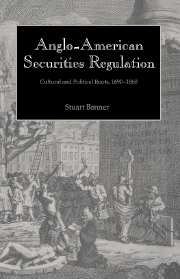Book contents
- Frontmatter
- Contents
- Selected statutes and cases
- Acknowledgments
- Note on dates
- Abbreviations
- Introduction
- 1 English attitudes toward securities trading at its inception, 1690–1720
- 2 The South Sea Bubble and English law, 1720–1722
- 3 English securities regulation in the eighteenth century
- 4 The development of American attitudes toward securities trading, 1720–1792
- 5 American securities regulation, 1789–1800
- 6 American attitudes toward securities trading, 1792–1860
- 7 American securities regulation, 1800–1860
- 8 Self-regulation by the New York brokers, 1791–1860
- Conclusion
- Bibliography
- Index
2 - The South Sea Bubble and English law, 1720–1722
Published online by Cambridge University Press: 23 October 2009
- Frontmatter
- Contents
- Selected statutes and cases
- Acknowledgments
- Note on dates
- Abbreviations
- Introduction
- 1 English attitudes toward securities trading at its inception, 1690–1720
- 2 The South Sea Bubble and English law, 1720–1722
- 3 English securities regulation in the eighteenth century
- 4 The development of American attitudes toward securities trading, 1720–1792
- 5 American securities regulation, 1789–1800
- 6 American attitudes toward securities trading, 1792–1860
- 7 American securities regulation, 1800–1860
- 8 Self-regulation by the New York brokers, 1791–1860
- Conclusion
- Bibliography
- Index
Summary
The eightfold rise in the value of shares in the South Sea Company during the first half of 1720 put the securities market in the public spotlight. As speculation in South Sea stock carried in its wake speculation in all sorts of smaller enterprises, the market for the first time drew investment from all strata of the propertied public, from all quarters of England and beyond. With expanding public participation came a far greater degree of public scrutiny, and published criticism, than the market had received in its first three decades. When South Sea stock, in the second half of 1720, fell by nearly as much as it had risen, dragging the smaller enterprises with it, that criticism grew even more intense.
This sequence of events, the first stock market crash in English history, has been known ever since as the South Sea Bubble. In the profusion of literature criticizing the market during and after the Bubble, opposition to the market crystallized into a few clearly defined arguments against securities trading. When securities markets began operating in the United States in the late eighteenth century, many of these arguments would reappear in American culture, and would stay there, with only minor changes, over the next two centuries. The Bubble would also bring forth a variety of proposals for regulation, some of which were adopted, but most of which were not. Many of these regulatory proposals would also be replicated later in the United States.
- Type
- Chapter
- Information
- Anglo-American Securities RegulationCultural and Political Roots, 1690–1860, pp. 41 - 87Publisher: Cambridge University PressPrint publication year: 1998



